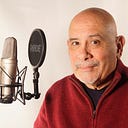You’re Probably Not Using Your Headphones Correctly
It’s more than just “putting them on your head.”
You would think using headphones would be a simple thing. Put them on your ears, adjust the volume, and you’re good to go. However, there are some headphone tweaks and tips I have learned that can be helpful while recording or broadcasting your show.
Let’s start with this one: Don’t adjust your voice because of what you hear in the cans (slang for headphones).
What do I mean by this? You might not like the sound of your voice when you hear it played back to you. Most people don’t. Everyone is usually surprised their voice sounds higher in pitch than they expected. This is because there is enough empty space in your head (insert joke here) to make it sound like an echo chamber, and it fools you into thinking your voice is deeper than it actually is.
So what happens is, when you’re listening to yourself in your headphones while recording, you start lowering the pitch of your voice to “sound better.”
Don’t do this!
What ends up happening is that people will hear you and think to themselves, “Why does he sound weird?” Because you will. You will start to sound “announcery.” Radio people call this puking. It doesn’t sound natural, and listeners will cease to relate to you as a real person.
Is there a simple way to keep this from happening?
It turns out there is. Only listen in one ear.
Put your headphones on so that one side is over one ear, and the other side gets put behind your ear, so that with the open ear you can hear the room. If you’re using in-ear headphones, put in one ear only. This is usually enough to keep you from falling into the “announcer” trap, and should make you stop listening to yourself. You’ll have to decide for yourself which ear to leave open. Whatever is more comfortable.
After a while you will get used to how your voice sounds (took me about two years). Over time you may think about covering both ears, but by then you may be used to one ear, and will continue to find it helpful. Personally, even after 30+ years, I still cover only one ear when recording my voice, though of course I cover both for music listening and production.
Now let’s talk about volume.
Do you really need it cranked? Sure, you can take the young person’s approach, telling yourself you’ll worry about hearing loss when you’re older. And sure, I can tell you that if you pump up the volume, that loss will come sooner than you think. But here’s the part that’s missing.
Your hearing loss is not going to be equal across all frequencies.
Many radio and music people start having issues with some frequencies dropping out of their range of hearing as they age. I personally lost the ability to hear some specific high frequencies, different ones than what natural aging would affect. Your hearing loss will not be the natural curve that usually happens.
Why should this matter to you?
It means someday you may need to have someone else listen to your mixes because you’re going to become blind to certain frequencies. A mix that sounds great to you is going to sound awful to other people. That’s the true crime for musicians and producers.
Some of the great engineers and producers learn to compensate, but you can’t rely on whether you’ll be able to. All I’m saying is, don’t overdo the volume when you’re working. If you manage a life that requires headphones all day, keeping it low when you can will extend your career. When you’re recording or broadcasting your voice on a show, you only need it loud enough to hear what’s going on. Headphones should be used to solely determine what’s on the air or being recorded.
One other thing on volume. Don’t have your cans so loud they bleed into the microphone.
That’s when you’ll get feedback. Especially if you’ve decided to use open ear headphones. And long stints of loud volume will lead to ear fatigue (a real thing), and you’ll start missing things.
I often get asked, do I need expensive headphones? Not necessarily. If all you’re doing is monitoring your broadcast or podcast, well, I’ve seen people use the cheap wired EarPods that used to come with iPhones, and they worked just fine.
But you’re going to want some semblance of quality if you’re going to produce or edit later. I don’t want to get into a discussion on which are the best headphones (a long, never ending discussion), but a lot of radio people use the reasonably priced Sony MDR7506’s. (Not an affiliate link)
Now go do a great show.
- ****************************************************************
- I am a 30-year veteran of radio and other media, with over a dozen years broadcasting morning shows. I’ve worked all across the country, including Los Angeles and San Francisco. My goal is to share the soft skills needed to be successful in podcasting and broadcasting. If you want to be notified when I post, click here.
Consider becoming a member by clicking here.
